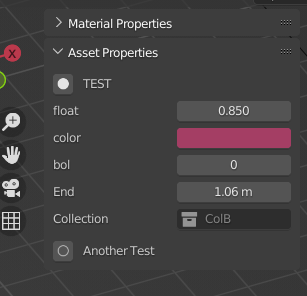I'm trying to create a custom UI that shows some geometry node modifier settings, So far it's working for the most part but Collection and Objects fields are grayed out :
Is there a way to make them editable as the other fields ? I've also tried a workaround by creating an EnumProperty that set collection inside the modifier , but I didn't managed to make it work as intended.
Any advices or something that would point me in the right direction would be very much apreciated ! Thanks !
Here is where I'm at with the script :
import bpy
from bpy.props import EnumProperty
from bpy.types import NodeSocketInterfaceCollection
class ModifierPanel(bpy.types.Panel):
"""Creates a Panel in the Object properties window"""
bl_label = "Asset Properties"
bl_idname = "OBJECT_PT_MOD"
bl_space_type = "VIEW_3D"
bl_region_type = "UI"
bl_category = "EnvTools"
@classmethod
def poll(cls, context):
return context.object is not None
def draw(self, context):
layout = self.layout
obj = context.object
for mod in obj.modifiers :
if mod.type != "NODES" : continue
row = layout.row()
grp = mod.node_group
row = layout.row()
for inp in grp.inputs :
if inp.type == "GEOMETRY" : continue
if inp.type == "COLLECTION" :
row.label(text=inp.name)
#row.prop(data = inp, property = "emb_col_enum", text = "")
row.prop(data = mod, property = f'["{inp.identifier}"]', text = "")
row = layout.row()
continue
row.label(text=inp.name)
row.prop(data = mod, property = f'["{inp.identifier}"]', text = "",)
row = layout.row()
def col_enum_items(self, context) :
cols = []
t = 0
for c in bpy.data.collections :
cols.append( (c.name, c.name, c.name, t) )
#cols.append( (c.name, c.name, c.name) )
t += 1
return (cols)
def col_enum_get(self) :
# work but misses default
#return(self["emb_col_enum"])
# locked
mod = socket_get_modifier(self)
col = mod[self.identifier].name
t = 0
for c in bpy.data.collections :
if c.name == col : return(t)
t += 1
return(0)
def col_enum_set(self, value) :
self["emb_col_enum"]=value
#mod = socket_get_modifier(self)
#mod[self.identifier] = bpy.data.collections[self.emb_col_enum]
def socket_get_modifier(socket) :
mod = None
mod_name = socket.id_data.name
for md in bpy.context.active_object.modifiers :
if md.node_group.name == mod_name : mod = md
return(mod)
def col_enum_update(self, context) :
mod = socket_get_modifier(self)
mod[self.identifier] = bpy.data.collections[self.emb_col_enum]
def register():
bpy.utils.register_class(ModifierPanel)
NodeSocketInterfaceCollection.emb_col_enum = EnumProperty(
name="Collection",
items=col_enum_items,
#get=col_enum_get,
#set=col_enum_set,
update = col_enum_update)
def unregister():
bpy.utils.unregister_class(ModifierPanel)
if __name__ == "__main__":
register()
print("reg")

